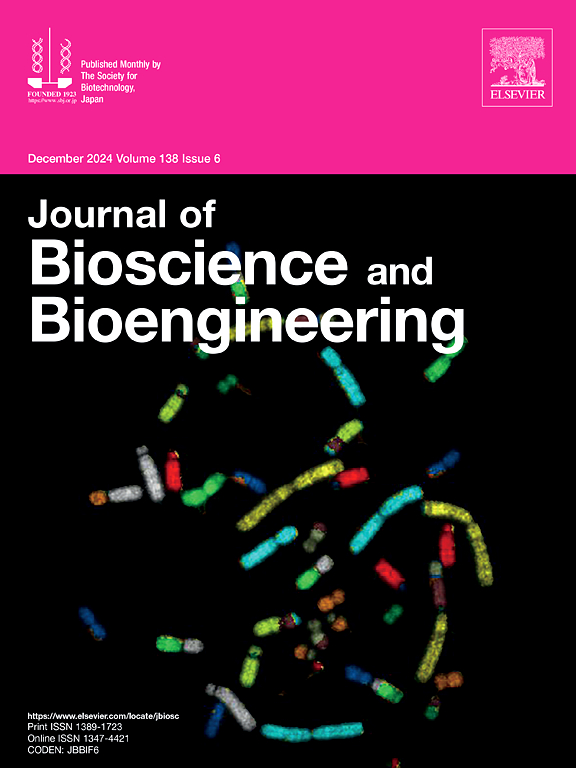Extracellular vesicles derived from specific lactic acid bacteria have agonistic activity against formyl peptide receptor 2
IF 2.9
4区 生物学
Q3 BIOTECHNOLOGY & APPLIED MICROBIOLOGY
引用次数: 0
Abstract
Lactic acid bacteria (LAB) play important roles in food microbiology and human health. Extracellular vesicles (EVs), which are drug transporters that contain functional components, derived from LAB have been recognized as materials with various beneficial effects, such as their anti-inflammatory effects. Owing to the complexity arising from strain-dependent functional differences in LAB, the functions of EVs derived from LAB have not been well elucidated. To investigate the strain-specific functions of EVs from LAB, we evaluated the ability of EVs from different LAB to induce interleukin 10 (IL-10) secretion by M2-like macrophages. The use of EVs with an increased capacity to induce IL-10 secretion and a G protein-coupled receptor (GPCR) assay revealed that EVs derived from specific lactic acid bacterial strains have agonistic effects against formyl peptide receptor 2 (FPR2). A strong and significant correlation between the ability of EVs derived from LAB to induce IL-10 secretion and agonistic activity against FPR2 was identified, and treatment with an FPR2 antagonist reduced the secretion of IL-10 induced by EVs from a specific lactic acid bacterial strain. Ultraviolet B (UVB) irradiation-induced damage to human keratinocytes was reversed after treatment with EVs with agonistic activity against FPR2, and this restorative effect was abolished by treatment with an FPR2 antagonist. In this study, we demonstrate for the first time that EVs derived from specific LAB have agonistic activity against FPR2; this activity could be a crucial factor in the anti-inflammatory effects of EVs released from specific LAB.
乳酸菌胞外囊泡对甲酰基肽受体2具有拮抗作用。
乳酸菌在食品微生物学和人体健康中起着重要的作用。细胞外囊泡(EVs)是一种含有功能成分的药物转运体,从乳酸菌中提取,具有多种有益作用,如抗炎作用。由于菌株依赖性功能差异的复杂性,从LAB衍生的电动汽车的功能尚未得到很好的阐明。为了研究来自LAB的ev的菌株特异性功能,我们评估了来自不同LAB的ev诱导m2样巨噬细胞分泌白细胞介素10 (IL-10)的能力。利用诱导IL-10分泌能力增强的ev和G蛋白偶联受体(GPCR)检测显示,特定乳酸菌菌株衍生的ev对甲酰基肽受体2 (FPR2)具有拮抗作用。从乳酸菌中提取的ev诱导IL-10分泌的能力与对FPR2的拮抗活性之间存在强烈而显著的相关性,用FPR2拮抗剂处理可降低特定乳酸菌株ev诱导的IL-10分泌。紫外线B (UVB)照射对人角质形成细胞的损伤在对FPR2具有激动性活性的ev治疗后得到逆转,而这种恢复作用被FPR2拮抗剂治疗所消除。在这项研究中,我们首次证明了来自特定LAB的电动汽车对FPR2具有拮抗活性;这种活性可能是特定LAB释放的ev具有抗炎作用的关键因素。
本文章由计算机程序翻译,如有差异,请以英文原文为准。
求助全文
约1分钟内获得全文
求助全文
来源期刊

Journal of bioscience and bioengineering
生物-生物工程与应用微生物
CiteScore
5.90
自引率
3.60%
发文量
144
审稿时长
51 days
期刊介绍:
The Journal of Bioscience and Bioengineering is a research journal publishing original full-length research papers, reviews, and Letters to the Editor. The Journal is devoted to the advancement and dissemination of knowledge concerning fermentation technology, biochemical engineering, food technology and microbiology.
 求助内容:
求助内容: 应助结果提醒方式:
应助结果提醒方式:


